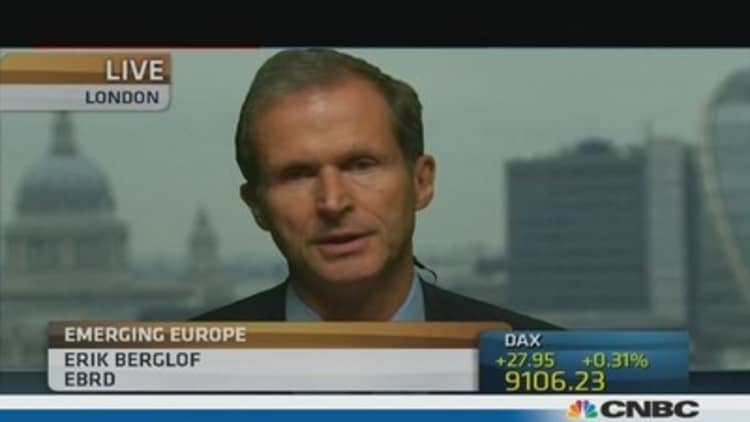Shares of Bulgaria's First Investment Bank fell more than 20 percent on Friday, extending losses, as the central bank warned of an attempt to destabilise the country through an organised attack on the banking system.
Bulgarian banks have been under pressure since depositors at another bank, Corporate Commercial Bank (Corpbank) rushed to withdraw deposits last week, unnerved by a report alleging problems.
Interior Minister Tsvetlin Yovchev told reporters on Friday that Bulgaria had started an investigation into attempts to destabilise the country's banking system, which include using the Internet and mobile phones to spread rumours about a bank.
Elsewhere in Central Europe, the forint rebounded from two-month lows as it drew bargain hunting, but it remains under pressure on rising expectations that Hungary will cut interest rates again soon.
The forint firmed 0.2 percent in early trade to 308.31, recovering after hitting two-month lows near 310 on Thursday.
Read MoreHungary isopen for business: Minister
"It rebounded from the 309 levels where (euro) sellers appeared, and 303-309 could be its short-term range now," one Budapest-based dealer said.
"But I would not be surprised at a weakening past 309. The global sentiment has worsened slightly and also there are domestic uncertainties like the foreign currency loans' issue."
Hungary will resolve the problem of households' caught with losses on foreign currency loans by forcing banks to convert them into forints, a move the government hopes will be completed later this year, Prime Minister Viktor Orban said on Friday.

Orban's comments had little impact on banking stocks as the moves had already been priced in. Hungary's biggest bank OTP was flat.
Expectations that Hungary could cut interest rates further are rising.
Hungary's central bank, in line with an expansion of its toolkit announced in April, extended cheap financing on Thursday at its first 3- and 5-year interest rate swap tender and demand surged for 5-year bonds at an auction the same day, knocking down yields and fuelling expectations for more interest rate cuts.
Hungarian government bonds firmed further on Friday, with yields approaching record low levels reached earlier this month.
"U.S. and German bond yields have come down, too, and that also supports bonds here," a Budapest-based bond trader said.
Polish government bonds were either flat to slightly firmer following a rebound after Prime Minister Donald Tusk won a key confidence vote in parliament on Wednesday. He has been grappling with Poland's biggest domestic political crisis for years after the publication of leaked tapes embarrassed senior officials.
"The market is almost unchanged today, but bonds are still trading at the lowest (yield) levels since May 2013," one Warsaw-based bond trader said.
Read MoreWhich country offers best investment opportunities in emergingEurope?
Recent data suggesting a weaker-than-expected economic recovery have fuelled expectations that Poland's central bank could also cut its main interest rate, now at a record low 2.5 percent.
Data on Thursday showed a sharp slowdown in annual retail sales growth to 3.8 percent in May.
"The deceleration does coincide with the plummeting PMI and weaker economic activity in the wake of the Ukraine crisis, and also with markedly low inflation in recent months," Commerzbank analyst Tatha Ghose said in a note.
"For the time being, this reading is one more which will boost MPC (central bank) dovishness, she said, adding that the bank could cut rates by 50 basis points by September.
The zloty, which firmed after the confidence vote, eased slightly against the euro on Friday.
Central European equities regained some ground, led by a 0.7 percent rise in Budapest's main index, after a fall earlier this week in tandem with developed markets.
Follow us on Twitter: @CNBCWorld




